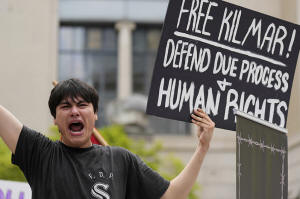Kilmar Abrego Garcia pleads not guilty to human smuggling charges in
Tennessee federal court
[June 14, 2025]
By TRAVIS LOLLER, JONATHAN MATTISE and BEN FINLEY
NASHVILLE, Tenn. (AP) — Kilmar Abrego Garcia, whose mistaken deportation
has become a flashpoint in President Donald Trump’s immigration
crackdown, pleaded not guilty Friday to human smuggling charges in a
federal court in Tennessee.
The hearing was the first chance the Maryland construction worker has
had in a U.S. courtroom to answer the Trump administration's allegations
since he was mistakenly deported in March to a notorious prison in El
Salvador.
Abrego Garcia’s attorneys have characterized the smuggling case as a
desperate attempt to justify the mistaken deportation. The investigation
was launched weeks after the U.S. government deported Abrego Garcia and
following a Supreme Court order and mounting pressure to return him.
Abrego Garcia's lawyers told a judge Friday that some government
witnesses cooperated to get favors regarding their immigration status or
criminal charges they were facing. A federal agent acknowledged during
his testimony that one witness was living in the U.S. illegally with a
criminal record and is now getting preferred status.
“He sounds like the exact type of person this government should be
trying to deport,” Federal Public Defender Dumaka Shabazz said. “They’re
going to give all these other people deals to stay in the country just
to get this one other person.”
Most of Friday's hearing focused on whether Abrego Garcia should be
released as he awaits trial. U.S. Magistrate Judge Barbara Holmes said
she will write her decision “sooner rather than later.”
The smuggling charges stem from a 2022 traffic stop for speeding in
Tennessee during which Abrego Garcia was driving a vehicle with nine
passengers. While officers suspected possible smuggling, Abrego Garcia
was allowed to go on his way with only a warning.
Body camera footage shows a calm exchange between officers and Abrego
Garcia. The officers then discussed among themselves their suspicions of
smuggling before letting him go. One of the officers says, “He’s hauling
these people for money.” Another says Abrego Garcia had $1,400 in an
envelope.

The federal indictment accuses Abrego Garcia of smuggling throughout the
U.S. hundreds of people living in the country illegally, including
children and members of the violent MS-13 gang.
In briefings before Friday's hearing, U.S. attorneys described Abrego
Garcia as a danger to the community and a flight risk. They also accused
him of trafficking drugs and firearms and of abusing the women he
transported, among other claims, although he is not charged with such
crimes.
Rob McGuire, Acting U.S. Attorney for the Middle District of Tennessee,
told the judge Friday that “migrant transportation is inherently
dangerous.”
The prosecutor also presented two orders of protection that Abrego
Garcia’s wife sought in 2020 and 2021 against him for domestic violence.
Jennifer Vasquez Sura said this spring that the couple had worked things
out “privately as a family, including by going to counseling.”
Abrego Garcia's attorneys rejected the prosecution's assertions that he
was a danger, while arguing the charges aren’t serious enough for
detention.

[to top of second column]
|

Tiki Osiris holds a sign as protesters gather outside the Federal
Courthouse before arguments whether Kilmar Abrego Garcia can be
released from jail on Friday, June 13, 2025 in Nashville, Tenn. (AP
Photo/George Walker IV)

“If Mr. Abrego Garcia is so dangerous, this violent MS-13 guy, why
did they wait almost three years to indict him on this?” Shabazz
asked the judge. “Why wait until literally after the Supreme Court
told them they denied him due process and they had to bring him back
before they investigate him?”
Special agent testifies
Friday's proceeding included testimony from a Department of Homeland
Security agent who quoted three unnamed witnesses who spoke to a
grand jury about Abrego Garcia’s alleged actions.
Special agent Peter Joseph said that the witnesses saw Abrego Garcia
trafficking people, guns or drugs and that Abrego Garcia earned
upwards of $100,000 a year. One man said Abrego Garcia was sexually
inappropriate towards underage girls, Joseph testified, while a
woman said Abrego Garcia had solicited nude photos of her when she
was 15 and she believed he was in the MS-13 gang.
During cross-examination, Abrego Garcia’s attorneys raised questions
about possible conflicts of interest. One man had been convicted of
a felony and was previously deported. He also was serving a 30-month
sentence when investigators contacted him, Joseph acknowledged. That
witness is now living in a halfway house and on his way to getting
work authorization.
The second man is a very close relative of the first witness and
“said he would help in return for his release from jail,” said
Richard Tennent, an assistant federal public defender. A third
witness had previously been compensated for her work with law
enforcement.
Tennent said one of the witnesses told investigators that Abrego
Garcia would drive roundtrip between Maryland and Houston — nearly
24 hours each way — two or three times per week. The witness said
Abrego Garcia usually had two of his children and his wife with him.
Tennent pointed out that Abrego Garcia has three children, two of
whom are autistic.
‘Kilmar wants you to have faith’
Abrego Garcia is a citizen of El Salvador who had been living in the
United States for more than a decade before he was deported. The
expulsion violated a 2019 U.S. immigration judge’s order that
shielded him from deportation to his native country because he
likely faced gang persecution there.
Before Friday’s hearing began in Nashville, Abrego Garcia’s wife
told a crowd outside a church that Thursday marked three months
since the Trump administration “abducted and disappeared my husband
and separated him from our family.”
Her voice choked with emotion, Vasquez Sura said she saw her husband
for the first time Thursday. She said, “Kilmar wants you to have
faith."
The decision to charge Abrego Garcia criminally prompted the
resignation of Ben Schrader, who was chief of the criminal division
at the U.S. Attorney's Office for the Middle District of Tennessee.
He declined to comment when reached by The Associated Press last
week. However, a person familiar with the matter who spoke on the
condition of anonymity to discuss a personnel matter confirmed the
connection.
All contents © copyright 2025 Associated Press. All rights reserved |